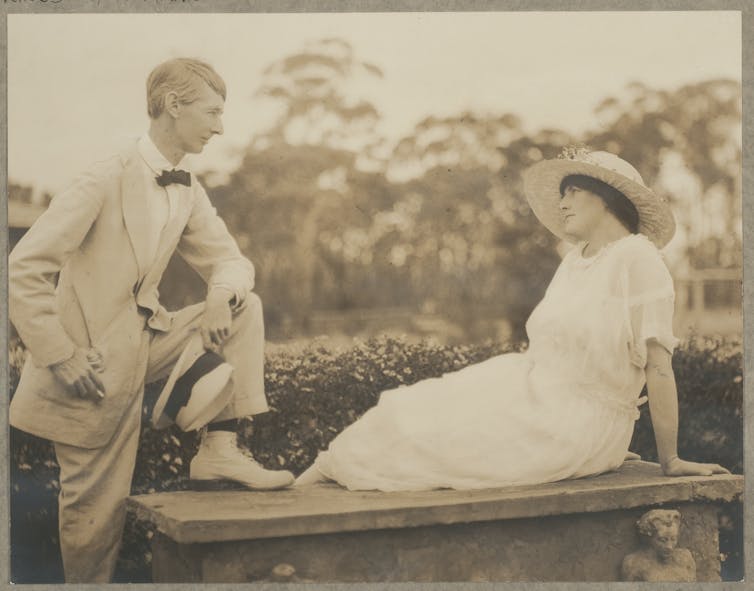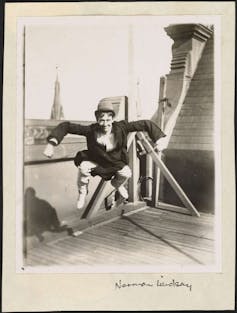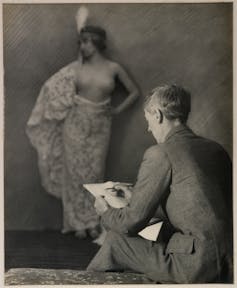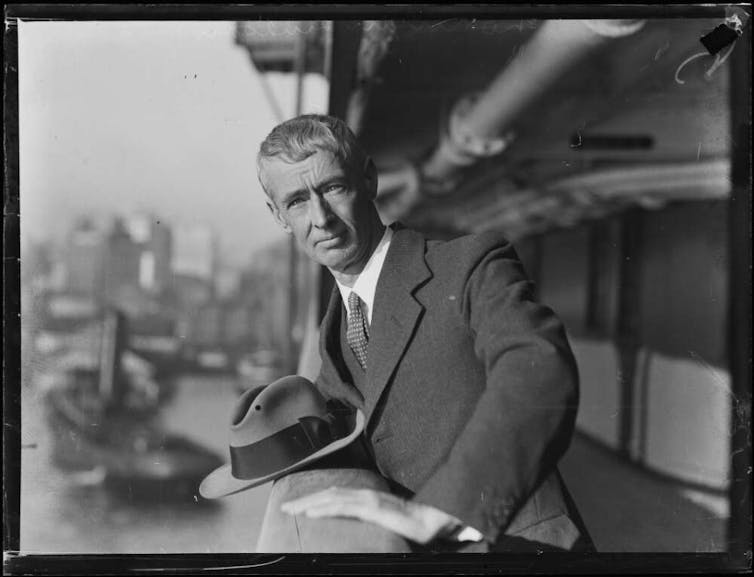stitched together stories of friendship and family seen for the first time
- Written by Megan Mooney Taylor, Sessional Academic in Creative Writing and Literature, Swinburne University of Technology
Norman Lindsay’s novel for children, The Magic Pudding, turned 100 last year and was widely celebrated. But the Lindsay family’s auction of three previously unseen manuscripts could help us gain a greater understanding of his novels for adults.
The manuscripts were held by Lindsay’s family since his death in 1969, and they have never been seen, aside from a few close friends and members of Lindsay’s family who were trusted readers.
They were auctioned by Sydney Rare Books in June, and all three were purchased by the State Library of New South Wales for the Mitchell Library Rare Manuscripts Collection, which has significant Lindsay holdings.
Turning brittle pages
Lindsay published eleven works of fiction from 1913 to 1968, including Redheap, the first novel by an Australian-born writer to be banned for import into Australia in 1930 from English publisher Faber and Faber after it was declared obscene by authorities.
His writing generally focused on small groups of friends, schoolmates or families and their complex relationships. The struggle for independence from the dominating and restrictive family is a constant theme in his work. These threads also tie the newly emerged manuscripts together.
To a literary archival researcher, these manuscripts are golden and shining and magnificent. To the average reader, though, they are a bit on the scrappy side.
Lindsay sewed his manuscripts together with thread, and then bound the spine in leftover canvas scraps he had lying around his studio. These bindings still hold, but not securely.
As the pages turn, the age of the manuscripts can be felt in the brittle fold – rather than bend, of the paper. There are brown cigarette burns on some of the pages, notes and even the sketch of a female face on others.
 Norman Lindsay with wife Rose, circa 1920. Photoraphed by Harold Cazneaux.
State Library of NSW
Norman Lindsay with wife Rose, circa 1920. Photoraphed by Harold Cazneaux.
State Library of NSW
Three novels
 Previously unseen novel Uncle Ben shows Lindsay’s cheeky side.
National Library of Australia
Previously unseen novel Uncle Ben shows Lindsay’s cheeky side.
National Library of Australia
The three novels, Bungen Beach, Landfalls and Uncle Ben, were written between 1940 and Lindsay’s death in 1969. Bungen Beach, was refused for publication by Angus and Robertson. They took another of his novels, Dust or Polish? instead, and released it in 1950.
The novels are a thematic continuation of the issues Lindsay addressed in his earlier, published, works; the restrictions of domesticity on the intellectual and sexual development of adolescents, the importance of homosocial relationships, artistic freedom and the social restrictions of small-town life.
The bigger story these manuscripts tell is one of a writer, an artist, who couldn’t let his mind or hands rest, who needed to be creating constantly. He had themes of creative and intellectual, as well as sexual and social, freedom on his mind. From Landfalls:
‘Hanged if I believe that only getting food out of it, and making a joke of it, solves the problem of life,’ he said.
‘And what is the problem of life?’ asked Cardigan blandly.
‘Well, hang it, developing - expressing yourself somehow. I mean, if you have something to say - if you want to write, for instance. Hang it, even developing a faculty - medicine, for instance…’
 Lindsay sketches at Springwood.
Mitchell Library, State Library of NSW
Lindsay sketches at Springwood.
Mitchell Library, State Library of NSW
This drive led him to write novels when the dusk fell and the light on his hilltop studio at Springwood was no longer conducive to painting.
Even though the narratives in two of these novels repeated many of the themes, and sometimes even the scenes, of novels he had written before, he was compelled to write them, to see if he could find a more effective form for his stories.
Bungen Beach follows two families living in a small community on the New South Wales coast, and the gradual sexual awakening of two women in those families, Vera and Norina.
This theme is one found in other Lindsay works, including Redheap, Pan in the Parlour, The Cousin from Fiji, and Miracles by Arrangement. Bungen Beach begins with two male escapees from the city, Archer and Pilbury, who add tension and humour to the narrative.
Landfalls, the novel dedicated to Lindsay’s biographer John Hetherington, returns to the town of Redheap to explore similar themes of sexual awakening, the ignominy of social and class restrictions, and the necessary escape from the home:
‘Well, they’re that high,’ said Elfie, which rewarded Ronald’s diplomacy with a smooth section of her midriff for investigation.
Instantly Mucker said ‘Let’s have a feel of high stomach’s on you, Trix,’ which abated Trixy’s primness to a squeal of ‘Ouch - that’s my real stomach.’
Fido passionately desired to approve himself an easy fellow on those terms, but his speechless adoration of Queenie could not bear to take liberties with her anatomy…
This novel is less cohesive than Bungen Beach or Uncle Ben, and the cast of characters sometimes feel outside the author’s control.
Scene of the crime
The return to Redheap as a setting is significant as it is the first time Lindsay returned to the fictional town after the novel of the same name was censored. Two of his other novels, Saturdee and Halfway to Anywhere, follow the same themes as Redheap and can be considered with it as a Bildungsroman trilogy – a literary coming-of-age genre – but their fictional township remains unnamed.
Lindsay felt the impact of the censorship keenly; he was worried he would be arrested and decided to leave the country, sending a telegram to The Daily Telegraph as his ship sailed:
Goodbye to the best country in the world, if it was not for the Wowsers.
The decision to revisit the fictionalised space that caused so much trauma would have been loaded with both emotion and rejuvenation.
 Lindsay sets sail, circa 1930.
National Library of Australia
Lindsay sets sail, circa 1930.
National Library of Australia
Of the three novels, however, it is Uncle Ben that is the most polished and well-executed. It brings in new characters and themes as well as drawing on Lindsay’s expertise in ships (he made models of them) and mining (his hometown of Creswick was a gold-mining town).
Seated on the slips of the boat shed, he and Ben smoked their dark plug tobacco while they recalled remembered ship’s runs, of which old sailors have the phenominal [sic] memory that a cruder faculty in the world of sport transfers to the pedigrees and performances of racehorses. But the record of a ship’s run is not merely a dry entry in her log, but a testimony to her lines, her masting and sailing plan, and the skill of those who handled her, vindicating a tradition in sea craft from Odysseus to Captain Walgett of the Cutty Sark.
The character of Uncle Ben, a wanderer and adventurer who returns to his family home following a mining accident, is richly drawn and complex, as well as having Lindsay’s signature humour and cheek. In one scene, Uncle Ben collects all the leftover food on the dining room table onto his plate, covers it in tomato sauce, and eats it noisily and joyously, to the discomfort of his snobbish nephews and nieces.
These new novels, each bringing their own clues from Lindsay’s rich imagination and unique perspective, add depth and understanding to research and study of Lindsay’s creative output.
This week is Sydney Rare Book Week.
Authors: Megan Mooney Taylor, Sessional Academic in Creative Writing and Literature, Swinburne University of Technology




